


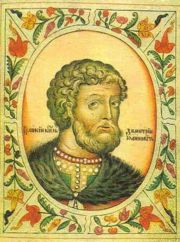
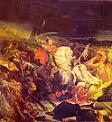
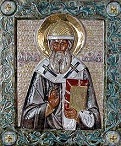

1380 By this decade the Byzantine Empire has been reduced by the Ottomans to Constantinople, Thessalonica, Trebizond, and some parts of the Peloponnesus. On Jan. 1 the Venetian fleet returns from the Mediterranean and blockades the Genoese fleet, which surrenders at Chioggia in June; having lost its fleet, Genoa begins losing its overseas possessions, finally losing its last one, Corsica, in 1768. In the spring Hesychast Neilos (Nilus) Kerameus (-1388) becomes patriarch of Constantinople (until 1388), convening a synod to decide the metropolitanate of Moscow after the death of St. Alexius (1295-1378); Moscow grand prince (since 1359) (St.) Dmitri II Donskoi (1359-89) chooses priest Mikhail (Mityaya), who wants Metropolitans to be enthroned in Russia than Constantinople, causing him to be accused of heresy, but dies last year on his way to Constantinople, and after baksheesh from Donskoi (cash from the Genoese and Turks), he decides to give it to Bulgarian-born Hesychast Cyprian (1330-1406), who is sacked for fleeing from Moscow as the Blue Horde approached in 1379, causing Pimen the Greek (-1389) to become metropolitan of Kiev and Great Russia in 1382-4, until it is discovered that he used forged letters from Grand Prince Dmitri II Donski, pissing-off Donskoi, who refuses to accept him, after which St. Dionysius I (1300-85), bishop of Suzdal (since 1374), who went to Constantinople to beg for Pimen's deposition is appointed in his place in 1384, but is arrested in Kiev at the orders of Prince Vladimir Olgerdovich at the insistence of Cyprian, dying on Oct. 15, 1385 without taking possession of his see; in 1390 Vasili II allows Cyprian to return to Moscow, and he is appointed metropolitan of Moscow and All Russia (until Sept. 16, 1406), going on to unite the Russian church with the grand duchy of Lithuania. On Sept. 8 after they decide not to pay the annual tribute, drawing an invasion, the Russians under Moscow grand prince (since 1359) (St.) Dmitri II Donskoi (1359-89) win a V against the Tartar Golden Horde under Khan Mamai at the Battle of Kulikovo (Kulikov) on the Upper Don River 200 mi. S of Moscow, becoming the first Russian V since the Mongol Conquest, although the Mongols return two years later to capture Moscow and put it under the Tartar Yoke, and continue to have the upper hand for the next cent.; the Lithuanian army under Jagiello agrees to aid Mamai, but reneges at the last minute, becoming the decisive factor; Dmitri II gets the name Donskoi ("of the Don") for the big V; after rival gen. Tokhtamysh (-1406) dethrones and kills Mamai, the Russian Orthodox Church begins celebrating a memorial for the battle on the Sat. before the Feast of St. Demetrius (d. 306); after learning that he rushed N to talk Jagiello into betraying Mamai, Dmitri II flops on Cyprian, inviting him to become metropolitan of Moscow, and imprisoning Pimen. On Sept. 16 French king (since 1364) Charles V the Wise (b. 1338) unwisely dies of mushroom poisoning, and his 12-y.-o. son (by wife Jeanne of Bourbon) Charles VI (the Well-Beloved) (the Mad) (1368-1422) is crowned Valois king #4 of France (until Oct. 21, 1422); his uncle Duke Philip II the Bold of Burgundy (1342-1404) becomes regent, and virtual ruler of France, although nominally sharing power with his other uncles, art-loving John the Magnificent of Valois, Duke of Berry (1340-1416) and Louis I of Naples (Taranto), Duke of Anjou (1320-62) ("the Princes of the Lilies"); meanwhile the men of Ghent siege, capture, and pillage Grammont in S France; the Hundred Years' War stalemates, with weak govts. on both sides languishing under internal disorders, and much of France in ruins; the English hold only Bordeaux, Bayonne, Brest, Calais, Cherbourg, and Valais; initially Charles is known as the Well-Beloved, until he suffers the first of his bouts of madness in 1392. Haakon VI of Norway (b. 1340) dies, and his son (by wife Margaret of Denmark) Olaf II of Denmark also becomes Olaf IV of Norway (until 1387), with Margaret as regent and real ruler, giving her control of Denmark and Norway; now all she has to do is get her hands on Sweden?; the capital of Norway is moved from Trondheim to Oslo. The English Parliament institutes a third, graded poll tax in an attempt to tax the rich more than the poor, but somehow it comes out the opposite of that in many communities, causing peasants to chafe, and tax evasion to become rampant, along with sporadic violence and unrest among the agricultural and urban classes. Pope Urban VI deposes Queen Joanna I of Naples for supporting his enemy Pope Clement VII; dwarf (under 3.5'-tall) Charles III the Short of Naples (1345-86) succeeds as king of Naples. Oxford U. theologian John Wycliffe (1324-84) gives a sermon in which he utters the soundbyte: "How should God approve that you rob Peter, and give this robbery to Paul in the name of Christ?" Leipzig obtains the privilege (Stapelrecht) of forcing all passing merchants to offer their goods for sale. In this decade the Bornu Empire (ends 1893) is founded in modern-day NE Nigeria on the ruins of the Kanem Empire, growing to incl. parts of Chad, Cameroon, and Niger. Poetry: Geoffrey Chaucer (1343-1400), The House of Fame; a dream vision of a glass temple adorned with images of the famous, where he meditates on the nature of fame with an eagle as his guide; first use in English of the words "galaxy" and "Milky Way"; used by Alexander Pope for "The Temple of Fame". Births: Spanish regent of Castile (1406-16) and king of Aragon, Valencia, Majorca, Sardinia, Corsica and Sicily, and count of Barcelona, Roussillon and Cerdanya (1412-16) Ferdinand I of Antequera (the Just) (the Honest) (d. 1416) on Nov. 27 in Medina del Campo; 2nd son of Juan I of Castile (1358-90) and Eleanor of Aragon; brother of Henry III (1379-1406); uncle of Juan II (1405-54). Czech Hussite (Ultraquist) gen. Andreas Prokop the Great (Holy) (Bald) (Shaven) (d. 1434). Italian Humanist historian Giovanni (Gian) Francesco Poggio Bracciolini (di Guccio) (d. 1459) in Terranuova (near Arezzo). German monk-scholar-mystic Thomas a (à) Kempis (Hamerken) (Hammerlein) (Ger. "small hammer") (d. 1471) in Kempen (near Krefeld), Prussia. Deaths: French constable Bertrand du Guesclin (b. 1320) in Chateauneuf-de-Randon (KIA). Welsh poet Dafydd ap Gwilym (b. 1325). French king (1364-80) Charles V (b. 1338) on Sept. 16 in Beaute-sur-Marne (mushroom poisoning). Norwegian king (1343-80) Haakon VI Magnusson (b. 1340) in Oslo. Italian nun St. Catherine of Siena (b. 1347); canonized in 1461.


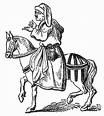

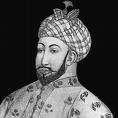


1381 In the spring Cyprian returns to Moscow to cheers, becoming its metropolitan, taking care to minister to Little Russia incl. Kiev, and writing The Life of Peter (the first metropolitan of Moscow), building up Moscow as the divinely-ordained center of Russian Orthodoxy, and Dmitri II Donskoi's line as the legitimate heirs of Kievan rule and rightful rulers of all Orthodox Russians. In late May after the landlords attempt to revert to the old servile tenures, the poll tax commissioner for Essex is rioted against, and Wat Tyler's Peasant Rebellion (Revolt) (Great Rising) begins, spreading to Kent then throughout SE England (S and E of the Exe-Tees line), reaching York and Somerset by June, destroying manor houses and game parks along with court rolls containing records of serfdom (tenures), and assassinating landlords and lawyers (while humming "When Adam delved and Eve span, who was then a gentleman?"); on June 12 100K pitchfork-shaking peasant rebels led by Wat Tyler (1325-81) and Jack Straw (Rakestraw) release John Ball (1338-81) from prison and reach the Thames River across from London, while more rioters from Essex approach from the N and E; on June 13 the gates are thrown open to the rebels by city sympathizers, and on June 14 14-y.-o. Richard II grants their leaders an interview and accedes to their demands for free tenancy and a reduction in rents, but balks at disendowment of the church and abolition of game laws, causing mob violence and destruction, incl. the murder of lawyers and officials, incl. Simon Theobald (Tybald) of Sudbury (b. 1316), archbishop of Canterbury (since May 4, 1375) (chancellor and poll tax polecat), the sacking of houses, the burning of the Savoy Palace of John of Gaunt, and the seizing of the Tower of London, causing the king to meet with the leaders again at Mile End outside the city bearing royal charters of manumission, which causes most of them to begin returning home; unfortunately Wat Tyler draws his dagger in the king's presence and is struck down by the king's followers, causing the 30K remaining rebels to converge on him, but the clever king saves his life by pretending to become their new leader, and then lets them disperse even when an army arrives from London to aid him; once he is safe, the rebellion is cruelly put down by autumn, and is a complete failure, the royal charters revoked and an attempt made to restore villeinage. Parliament refuses to grant taxes for the war against France, and a 6-year English-French Truce is arranged. The men of Ghent capture the Abbey of Eenaeme. The English Parliament passes the first Navigation Act, showing England's growing nat. monopoly of naval commerce. Edmund of Langley makes a fruitless expedition to help Ferdinand I of Portugal against Juan I of Castile, who attacks Portugal to defeat the schemes of John of Gaunt to take his crown. John de Neville, 3rd Baron Neville de Raby (1337-88) is appointed English warden of the Scottish border. A statute is enacted in England mandating the use of bills of exchange, and prohibits the future export of gold and silver specie to settle foreign commercial transactions; the system is later adopted in the U.S. The War of Chioggia (begun 1378) between Venice and Genoa allied with Hungary ends with the Peace of 1381 (Turin), which acknowledges Venetian supremacy in its long struggle with Milan-Genoa after it cedes Dalmatia and pays tribute; Genoese political influence in the Mediterranean and the East is kaput. Peter IV of Aragon becomes duke of Athens and Neopatria (until 1387). Saarbrucken in W Germany comes under control of the counts of Nassau-Saarbrucken (until 1793). Sunni Muslim C Asian Turco-Mongol-Persian military adventurer Tamerlane (Timur-i-Lang) (Temur the Lame) (1336-1405) ("timur = iron) (not really lame?) begins 35 successful campaigns to Persia, Russia, Georgia, Syria, Egypt, and other parts, first conquering Persia and its capital Herat; the Shiite Sarbadar regime based in Sabzavar comes under his suzerainty; Tamerlane goes on to establish an empire in Persia, Iraq, and Syria, with capital in Samarkand in modern-day Uzbekistan. Kadi Burhan al-Din Ahmed (Burhaneddin) (1345-98), vizier of the principality of Eretna in NE Anatolia usurps the sultanate (until 1398), becoming a popular poet. Nonfiction: John Wycliffe (1324-84), Confession Concerning the Eucharist; denies that the "substance" of bread and wine are miraculously annihilated during the Eucharist - the secrets that made it taste so good? Births: Italian patriarch #1 of Venice (1451-6)(St.) Lawwrence Giustiniani (d. 1456) on July 1 in Venice; feast day: Jan. 8. Scottish nobleman John Stewart, Earl of Buchan (d. 1424); son of Robert Stewart, 1st duke of Albany (1360-1420) and 2nd 2ife Muriella Keith; husband of Elizabeth Douglas (1385-1451), daughter of Archibald Douglas, 4th earl of Douglas; father of Margaret Stewart (1424-60), wife of George Seton, 3rd lord Seton. Deaths: English archbishop of Canterbury (1375-81) Simon Theobald (Tybald) of Sudbury (b. 1316) on June 14 in Tower Hill, London (beheaded). English rebel Wat Tyler (b. 1325) on June 15 (KIA). Swedish nun St. Catherine of Vadstena (b. 1332) on Mar. 24; canonized in 1484 by Pope Innocent VIII. English nobleman Edmund Mortimer, 3rd earl of March (b. 1352) on Dec. 27 in Cork, Ireland (KIA).

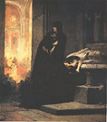




1382 On Jan. 24 Richard II's 7-y.-o. heir presumptive Roger Mortimer, 4th Earl of March (b. 1374) is made lord lt. of Ireland, with his uncle Sir Thomas Mortimer acting as his deputy; he is reappointed on July 23, 1392, and in Sept. 1394; on Apr. 25, 1396 he is appointed lt. in Ulster, Connacht, and Meath; in Apr. 1397 he is reappointed lord lt. of Ireland for three more years; too bad, on Sept. 4, 1397 he is ordered to arrest his uncle Sir Thomas Mortimer for treason over the 1387 Battle of Radcot Bridge, which he neglects to do, and in Jan. 1398 he is summoned to a parliament in Shrewbury om Shropshire, where a vast crowd wearing his colors "rapturously receives" him, pissing-off Richard II, after which his nephew and enemy Thomas Holland, 1st Duke of Surrey, 3rd Earl of Kent, 4th Baron Holland (1374-1400) is ordered to arrest him, but before he can do that on July 20, 1398 Mortimer is KIA in Ireland, while on Juy 27 unaware of his death Richard II dismisses him as lord lt. of Ireland, appointing Holland in his place and ordering him on Jan. 22, 1399 to accept all the homages due to himself during the remainder of his term; too bad, after Richard II is deposed on Sept. 29, 1399, Holland loses his appointments. On May 24 emperor (since 1371) Go-En'yu (b. 1359) abdicates, and his eldest son Go-Komatsu (1377-1433) (personal name Motohito) becomes Japanese Ashikaga (northern) pretender emperor #6 (until 1412); meanwhile S emperor Go-Kameyama refuses to turn over the three sacred treasures (until 1392). On Sept. 10 Louis I the Great (b. 1326) dies, leaving his 10-y.-o. daughter Mary of Anjou as queen Mary of Hungary (1371-95), with her mother Elizabeth (Elisabeth) of Bosnia (1340-87) (daughter of Stephen II) as regent; Mary's position is challenged by Charles III of Naples, who gains a following in S Hungary and Croatia. On Nov. 4 Scottish high chamberlain (since 1377) Sir John Lyon, Thrane of Glamis (b. 1340), Robert II's son-in-law and chamberlain is killed in a quarrel with the king's nephew Sir James Lindsay of Crawford, and his 2nd son Robert Stewart, Duke of Albany, Earl of Fife (1340-1420) becomes high chamberlain, taking control of Scottish finances and using his position as regent along with his elder brother Lord Carrick to jockey for control of the kingdom. In Nov. Philip the Bold leads France on an expedition in support of his father-in-law the count of Flanders against the pro-Roman Catholic Flemish rebels under Philip van Artevelde (1340-82), and defeats them at the Battle of Roosebeke, massacring them "without pity, as though they had been but dogs"; van Artevelde is KIA; Duke Wenceslas of Brabant punishes the pop. of Louvain, Belgium so severely for an attempted insurrection that thousands of weavers emigrate to Holland and England, and it begins declining as an industrial town and turning into a univ. town. The Genoese regain control of Constantinople. The Turks capture Sredetz (ancient Sardica) and rename it Sofia from the 12th cent. Church of St. Sofia, which they turn into a mosque. The Mongols under Tokhtamysh capture Moscow in a surprise attack, sack and burn it, and get Dmitri II Donskoi to flop and pledge allegiance and restore the tribute payment; too bad, after finding that he snuck out to Tver during the attack, pissing off patriarch Neilos Karameus, Dmitri II flops on Cyprian again, booting him out of Moscow and reinstalling Pimen as metropolitan, only to withdraw support for him, but never allow Cyprian back in. Leopold III of Austria acquires Trieste. Witowt and his father are imprisoned by his cousin Ladislaus Jagiello (future Ladislaus II) in a dispute over the title of grand duke; the father dies in prison, but the son escapes and takes refuge with the Teutonic Knights, plotting to get his territory back. Dawit I (-1413), younger son of Newaya Krestos becomes Solomonic emperor of Ethiopia (until 1413), going on to invade Egypt as far as Aswan. Having the peasants kicked down nicely, the English teen king goes Bohunk to relax and enjoy every drop of life from the time his first short and curly sprouts? 16-y.-o. Richard II of England (b. 1366) marries Anne of Bohemia (1366-94), eldest daughter of Charles of Luxemburg, king of Bohemia (later HRE); her noblemen sport shoes with foot-long tips, causing the fashion of wearing Crackowes (Poulaines) to catch on in England - wouldn't it be great if your insides could be this happy? Juan I of Castile forces Ferdinand I of Portugal (d. 1383) to give him his daughter Beatrice (Beatriz), Heiress of Portugal in marriage to end the fight between the two kings. John of Gaunt balks at John Wycliffe's desire to overthrow the Church, only wanting to limit its authority in temporal matters, and repudiates his connection with him; a convocation of the province of Canterbury, led by William Courtenay, archbishop of Canterbury condemns several of his writings as heretical, esp. the one against holy cannibalism (transubstantiation), causing him to be banished from Oxford to his rectory at Lutterworth (until 1384), where he continues organizing his Lollards; the efforts of the convocation to get the king's council to enact an ordinance ordering the arrest of the heretics is stymied by Parliament at its next session, letting them have a free hand for 20 years (until 1401), although Courtenay purges Oxford of Lollards, making it a movement of the non-degreed classes; meanwhile the pope summons Wycliffe to undergo trial before the papal court, but he gets out of it somehow by claiming age and illness and stalling - out of the mouth of babbling babes? Barkuk Barkuk (Al-Malik az-Zahir Sayf ad-Din Barquq (Arab. "plum") (-1399) becomes sultan #1 of the Mamluk Burji Empire (ends 1517) (until 1389, then 1390-9), the first Circassian (and Burji) ruler, ending the Bahriyya sultanate (begun 1250); from now on the empire's revenues decline. Winchester College boarding school for boys is founded in Winchester, Hampshire, England by bishop William of Wykeham (1320-1404); the first 70 poor scholars enter the school in 1394; it is founded in conjunction with New College, Oxford U. as a feeder, becoming a model later followed by Eton School and King's College, Cambridge U., and Westminster School and Christ Church, Oxford U. and Trinity College, Cambridge U. Architecture: Jasna Gora Monastery is founded in Czestochowa, Poland, housing the Black Madonna of Czestochowa, which attracts large numbers of pilgrims. The Khan al-Khalili Market (Souk) in Cairo is founded, becoming a major tourist attraction. Nonfiction: 135 years before Martin Luther of Germany, an anti-Roman Catholic Reformation is brewing in England? John Wycliffe (1324-84), English Trans. of the Latin Bible; first new trans. in a millennium, based on the Latin Vulgate Bible; actually Wycliffe doesn't merely translate but creates the New Testament, writing it originally in English and Latin, and it is actually a code history of 14th cent. Europe, incl. the Avignon papacy? Births: Austrian Hapsburg duke (1402-39) and count of Tirol (1406-39) Frederick IV (of the Empty Pockets) (d. 1439); younger son of Leopold III (1351-86); brother of William the Ambitious (1370-1406), Leopold IV (1371-1411), and Ernest the Iron (1377-1424); husband of Anna of Brunswick; father of Sigismund of Austria (1427-96). French grand chamberlain (to Charles VII) Georges de la Tremoille (Trémoille) (d. 1446). Danish-Swedish-Norwegian king (1389-1442), Danish king (1396-1439), and Swedish king (1396-1439) Erik (Eric) III/VII/VIII/XIII of Pomerania (d. 1459); son of Duke Vratislav VII of Pomerania and Maria of Mecklenburg; grandnephew and adoptive son of of Queen Margreta (Margaret) I of Denmark; first king of the Nordic Kalmar Union. Deaths: Lithuanian grand duke Kestutis (b. 1297) on Aug. 3 in Kreva (assassinated). French philosopher Nicole Oresme (b. 1320); leaves Tractatus de Configurationibus Qualitatum et Motuum, which distinguishes between intensity and quantity of heat, anticipates rectangular coordinates and the treatment of time as a variable, and proves the divergence of the harmonic series; Treatise on the Origin, Nature, Law, and Alterations of Money. Hungarian king (1342-82) and Polish king (1370-82) Louis I the Great (b. 1326) on Sept. 10 in Nagyszombat/Trnava. Scottish high chamberlain (1377-82) Sir John Lyon, Thane of Glamis (b. 1340) on Nov. 4.


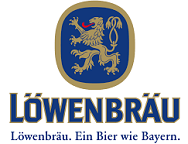
1383 The Hundred Years' War is renewed; the Battle of Dunkirk sees the Flemish fight the English under Bishop Henry Despenser of Norwich. In May Binnya U, Buddhist king #8 since 1348 of the Hanthawaddy Kingdom in Burma, known as the Lord of the White Elephant dies in Pegu (modern-day Bago). On Oct. 22 king (since Jan. 18, 1367) Ferdinand I the Inconstant (b. 1345) dies, and his half-brother (illegitimate son of Pedro I by his lover Ines de Castro) Joao (John) I (the Great) (the Bastard) (1357-1433) becomes king #10 of Portugal (until Aug. 14, 1433). Amadeus VI dies, and his son Amadeus VII (-1391) becomes count of Savoy, going on to secure Nice in 1388 to give Savoy an outlet to the sea - which is nice? Scotland and France renew their Auld Alliance, with France promising support for a joint campaign against Richard II of England. London lord mayor John Comberton de Northampton persaudes the city council to declare the monopoly of the Fishmongers' Co. (founded 1272) to be ended; Richard II restores it in 1399, although they lose their Leyhalmode, a court of law to settle disputes over the seafood trade. Lowenbrau (Löwenbräu) (Ger. "Lion's Brew") Brewery is founded in Munich, Bavaria, Germany; in the 17th cent. it adopts the lion logo; in 1863 it becomes the largest brewery in Munich (25%); in 1928 production reaches 26M gal./year; in the 1930s it is owned by Joseph Schulein (Schülein), a Jew, causing the Nazis to diss it as "Jew beer"; in 1945 the brewery is destroyed in an air raid, and in 1948 after being rebuilt it begins exporting beer to Switzerland, going on to be featured at the 1967 Montreal Expo as the archetype of Munich beer; in 1975 Miller acquires North Am. rights, followed in 1999 by Labatt; in 1997 Lowenbrau merges with Spaten-Franziskaner-Brau, which is acquired in 2003 by Interbrew, which merges in 2004 with AmBev to form InBev, which in 2005 acquires Anheuser-Busch to create Anheuser-Busch Inbev; in 2002-14 Lowenbrau resumes exports to North Am., after which Labatt begins brewing a clone in London, Ont., Canada, causing critics to pan it as inferior. Architecture: Philip the Bold gives a gong clock to the Cathedral of Notre Dame de Dijon in France, built by Jacques Marc, which keeps on ticking to modern times, striking once an hour. Births: Florentine painter Masolino ("Little Tom") da Panicale (Tommaso di Cristoforo Fini) (d. 1447) in Panicale di Valdelsa (near Florence). Deaths: Byzantine emperor John VI (V) Cantacuzene (Cantacuzenos) (b. 1292). Portuguese king (1367-83) Ferdinand I the Inconstant (b. 1345) on Oct. 22 in Lisbon.




1384 On Jan. 2 king (since 1348) Binnya U (b. 1323) is KIA in Pegu while quelling a rebellion by 16-y.-o. Binnya Nwe, who becomes Burmese Hanthawaddy king #9 Razadarit (Burmese "King of Kings" (1368-1421) (until 1421), going on to conquer the rebellious regions of Martaban (Mottama) and Irrawaddy Delta and win the Forty Years' Ava-Pegu (Mon-Burmese) War with the N kingdom of Ava (Inwa) (ends 1424). On Oct. 16 after the magnates of Lesser Poland balk at union with Hungary, and choose 9-y.-o. Jadwiga (Jadviga) (1374-99) of the Capetian House of Anjou, daughter of Louis I of Hungary and Elizabeth of Bosnia, she is crowned king instead of queen of Poland to rule in her own right (until July 17, 1399); her Hapsburg fiancee William the Ambitious (1370-1406) of Styria is rejected as not good enough, causing him to become known as William the Courteous, but he soon gets engaged to her Angevin relative Joan of Naples, making for the saying "Bella gerant alli: tu felix Austria nube" (Let others make war: thou happy Austria, marry) - somewhere somebody must have kicked you around some? In Nov. after seeking Scotland's inclusion in Anglo-French peace talks, "infirm" Robert II is unoficially deposed in a bloodless palace coup by his eldest son John, earl of Carrick, who becomes lt. of Scotland, leading a coalition of nobles headed by James Douglas, 2nd Earl of Douglas (1358-88) and the Lindsay clan, and the war with England is on; meanwhile John's younger brother Alexander builds his own territorial empire in the highlands using caterans (Gaelic mercenary cos.), taking Ross, causing parliament to fume. The Castilians siege Lisbon. Cousins Ladislaus Jagiello and Witowt become reconciled, but Jagiello keeps Lithuania and gives him some Russian territory, which doesn't satisfy him. Tamerlane captures Herat, Sistan, Rayy, and Il-Khanid (capital of Sultaniyeh). Louis de Male, last count of Flanders dies, and through his daughter Margaret of Flanders, Duke (since 1363) Philip II the Bold of Burgundy (1342-1404) inherits Flanders, Franche-Comte (the county of Burgundy), Artois, Nevers and Rethel, pissing-off the Plantagenets with a bold new danger on the N and E; the town of Douai (Douay) on the Scarpe River in N France is among his new toys; meanwhile the duke of Anjou dies, leaving Philip II in the driver's seat that way, pissing off Charles VI, who declares himself of age and begins his personal rule by replacing him with his own brother Duke Louis of Orleans, and the rivalry between the bold houses of Burgundy and Orange is on. Pope Urban VI excommunicates Charles III of Naples. The first beer brewery in Austria is founded in Vienna on the Weidenstrasse. Poetry: Geoffrey Chaucer (1343-1400), The Parlement of Foules. Deaths: Burmese king (1348-83) Binnya U (b. 1323) on Jan. 2 in Pegu (KIA). English morning star religious reformer John Wycliffe (b. 1324) on Dec. 31 in Lutterworth; dies of paralysis while ministering to his parish church, a rare peaceful death for a heretical celeb in those days; in 1428 the Council of Constance makes up for lost time and has his body dug up and burned, along with 200 of his books, and his ashes cast into the Swift River near Lutterworth (which flows into the Avon River, then into the Severn River, then into the ocean, spreading worldwide, like his doctrines?); his example launches a stream of reformers incl. Jan Huss (1369-1415), Girolamo Savonarola (1452-98), Ulrich Zwingli (1484-1531), Martin Luther (1483-1546), and John Calvin (1509-64). Scottish nobleman William Douglas, 1st earl of Douglas (b. 1327) in Douglas, South Lanarkshire. French king of Naples (1382-4) Louis I of Anjou (b. 1339) on Sept. 20 in Bari.

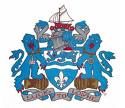

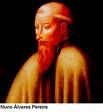

1385 In Apr. John (Joao) I (1357-1433) is chosen king of Portugal in violation of the rights of the Infanta Beatrice, wife of Juan (John) I of Castile; at his accession an uprising occurs, and Queen Leonora calls on Juan I of Castile to help her daughter Beatrice take the throne; Joao I, master of the Order of Avis is supported by John of Gaunt, who wants the crown of Castile; a 300-man Castilian force under seven capts. raids Portugal, and the 200-man Trancoso garrison under Joao Fernandes Pacheco intercepts them, driving them off with heavy losses, only one Castilian capt. surviving; on Aug. 14 Joao I of Portugal, aided by the English defeats an invasion by Juan I of Castile (aided by the French) at the Battle of Aljubarrota, killing 4K-5K French and Castilians vs. less than 1K of his own, and securing his throne; Dom Nuno (Nuño) Alvares (Álvares) Pereira (1360-1431) becomes Portugal's hero, and a shoe-in for saint; Juan I supporter Don Pero Lopez de Ayala (1332-1407) is captured, and ransomed in 1398 for 30K doubloons, using his prison time to become a writer and churn out some cool works. In June 1.2K French troops led by John de Vienne land in Scotland, hook up with Scottish leaders Robert Stewart et al. and invade N England; out-of-the-way king Robert II has "red-bleared eyes, of the colour of sandalwood, which clearly showed that he was no valiant man, but one who would rather remain at home than march to the field", and stays out of the military action; meanwhile Edward III's son Edmund of Langley is made Duke of York in N England, founding the future ruling white rose House of York, which develops bad blood with the blood red rose House of Lancaster. The Ottomans conquer Sofia. A 50K-man Mongol army under Kahan Tokhtamysh invades Persia and takes Tabriz, then returns with 200K slaves from the Caucasus, incl. tens of thousands of Armenians, allowing Tamerlane to annex Persia and Azerbaijan, pissing Tokhtamysh off and causing him to declare war, then finally giving up and withdrawing to the steppes by next year. Duke Philip II the Bold of Burgundy completes the pacification of Flanders. Sigismund of Luxembourg tries to to horn his way into the throne of Hungary by marrying queen (since 1382) Mary of Hungary, but Charles III of Naples is too fast for him and deposes her, becoming Charles II of Hungary, but not fast enough, as Mary's mother queen Elizabeth have him assassinated next year. Olav, son of Queen Margreta of Denmark and Norway is acknowledged as future king of those countries. Duke Gian Galeazzo Visconti (1351-1402) has his uncle Bernabo murdered, becoming sole ruler of Milan (until 1402), going on to create a kingdom in N Italy, adding Verona (1387), Vicenza (1387), Padua (1388), Pisa (1399), Siena (1399), Assisi (1400), Perugia (1400), and almost but not quite Florence; he marries Isabelle of Valois (1348-72), daughter of King John II of France, then marries his daughter Valentina Visconti (-1408) to Louis of Orleans, giving Louis XII a later claim on Milan. Sir Henry Percy (Hotspur) (1364-1403) becomes gov. of Berwick. The original gay eye for the straight guy? 18-y.-o. Richard II refuses to change his ministers at the request of Parliament, signaling his intention to throw off their superintendence as he reaches the age of majority; he institutes the title "your majesty" for himself; his favorite Robert de Vere, 9th Earl of Oxford (1362-92) is created marquess of Dublin, becoming the first hereditary English marquess; it now goes prince/princess, duke/duchess, marquess/marchioness, earl/countess, baron/baroness, until 1440 when viscount/viscountess (first used in 1387) is officially added for a discount entry into the peerage between earl and baron - PDMEVB - princes don't marry every vain body? English troops of the Duke of Lancaster take the town of Ribadavia in Galicia and sack the Jewish quarter. German king Wenceslaus IV the Drunkard arrests Jews in the Swabian League free cities in S Germany after a quarrel with the archbishop of Salzburg, causing them to declare war (ends 1389). The first-ever French court ball is held at the wedding of Charles VI and Isabella of Bavaria - let's have a what? Plays: Geoffrey Chaucer (1343-1400), Troilus and Criseyde; in Apr. Saturn and Jupiter meet in Gemini and move into Cancer for the first time in over 600 years; the Moon joins them in mid-May, the time of the dinner party thrown by Criseyde's uncle Pandarus while Troilus hides in a closet? Births: Spanish princess Yolande of Aragon (Violant d'Arago) (d. 1442) on Aug. 11 in Saragosa; daughter of John I of Aragon (1350-96) and Yolande of Bar (1365-1431); sister of Countess Joanna of Foix; niece of Martin the Elder of Aragon (1356-1410); wife of Louis II of Anjou (1377-1417); mother of Louis III of Anjou (1403-34), Marie of Anjou (1404-63), and Rene I of Naples (1409-80). Welsh soldier-courtier (founder of the Tudor Dynasty) Sir Owen Tudor (Owain ap Maredudd ap Tydir) (d. 1461); son of a brewer descended from Welsh prince Rhys ap Gruffudd ("Lord Rhys") (1132-97); anglicizes his name Owain ap Maredudd (Meredith) Tudor (Theodore) by taking his grandfather's name Owain then anglicizing it to Owen, but keeping the Welsh name Tudor; secret hubby (1428-) of Henry V's widow Catherine of Valois (1401-37); father of Owen Tudor (1429-1501) (a Westminster monk), Edmund Tudor, 1st earl of Richmond (1430-56) (father of Henry VII), Jasper Tudor, 1st duke of Bedford (1431-95) (husband of Katherine Woodville), Tacina Tudor (1433-69), Daughter Tudor (1435-) (nun); also has bastard son Sir David Owen (1459-1528). Greek humanist metropolitan of Kiev cardinal Isidore of Kiev (Thessalonica) (d. 1463 in Peloponnesus. Births: English bishop of Lincoln (1419-31) (founder of Lincoln College, Oxford U.) Richard Fleming (d. 1431) in Crofton, Wakefield, Yorkshire. Italian Franciscan "athlete of Christ" St. John Capistran (d. 1456). Tibetan Buddist saint Thangtong Gyalpo (Chakzampa") (the Iron Chain Maker) (Tsondru Zangpo) (Excellent Persistence) (King of the Empty Plain) (Madman of the Empty Valley) (d. 1485); inventor of the iron chain suspension bridge; most traveled Tibetan person in history. Deaths: Russian Orthodox metropolitan (1384-5) St. Dionysius I (b. 1300) in Kiev; dies in prison.




1386 In Jan. Charles II of Hungary (Charles III of Naples) is assassinated by Queen Mary of Hungary's mother Elizabeth, and Mary is restored, causing a new revolt in Croatia; too bad, Elizabeth and Mary are captured by the Horvat brothers Paul and Ladislaus on the orders of Mary's mean hubby Sigismund of Luxembourg. On May 9 the Treaty of Windsor, sealed by the promised marriage of John I of Portugal and Philippa of Lancaster (duke of John of Gaunt, 1st Duke of Lancaster) establishes a mutual support pact and recognizes John I as the undisputed king of Portugal; it is not rescinded until ?. On July 9 Hapsburg Duke Leopold III of Austria (b. 1351) is defeated and killed by the Swiss confederation supported by the Swabian League at the Battle of Sempach 10 mi. N of Lucerne (he has 3K-4K men, vs 6K-8K for them); the Swiss prove they're a force despite the bloody Black Death. In July John of Gaunt departs England with his wife to invade Castile and make good the claims of his son-in-law Joao I of Portugal against Juan I of Castile, and captures Santiago de Compostela; meanwhile Richard II's power is weakened when the nobles force themselves on him as a governing council, and John of Gaunt loses control of the govt. and supports the king to prop him up. The Scots and French quarrel, and the English invade Scotland, burning most of Lothian incl. Edinburgh, forcing the Scots to accept a truce (until 1388). Under my thumb, the girl who once had me down? 11-y.-o. Roman Catholic Queen Jadwiga, heiress of the Polish throne marries grand duke Jagiello (Jogaila) of still-pagan Lithuania after he converts to Roman Catholicism, and he becomes Polish king Wladyslaw II Jagiello (1362-1434) AKA Jogaila, founding the Jagiellon Dynasty in Poland, and ramping up Poland's Golden Age; the grand duchy of Lithuania is annexed by the Polish kingdom, causing the Teutonic Knights to declare war on Poland to attempt to help Ladislaus' pagan cousin Witowt get it back (in 1392). Mircea I (the Elder) (the Old) (the Great) (-1418), son of Radu I becomes ruler of Wallachia (until 1418), going on to increase the principality's borders from the Olt River in the N to the Danube River in the S, and the Iron Gates of the Danube River in the W to the Black Sea in the E. At the Royal Council of Nyborg, Queen Margreta enfeoffs the dukes of Holstein with Schleswig. Tamerlane begins seizing Greater Armenia and massacring its Christian pop. (ends 1394), allowing Tokhtamysh to invade Transoxiania, until heavy snow forces him back to the steppes. The Ottomans conquer Nish in S Serbia. The Genovese Embassy introduces aqua vitae (water of life) to the Moscow Grand Duchy, acquainting them with the "pernicious drink" (good antifreeze for the blood?) Vodka - so the Italians did to the Russkies what the Euros did to the American Indians? Richard II's favorite Robert de Vere is created duke of Ireland. Chinese emperor Ming Taizu orders his officials to buy back children sold into slavery in Hainan Province by their parents during a famine. German king Wenceslaus IV expels the Jews of Strassburg and confiscates their property. The town council of Frankfurt, Germany forbids the employment of Christians by Jews, and restricts the number of Jewish servants in a household; in 1412 there are only 27 Jewish households in the city, which drops to four in 1416. The town of Stryi in W Ukraine is first mentioned as part of the kingdom of Poland; in 1387 Polish king Jogaila gives it to his pro-Russian brother Svitrigaila. A judge in Falaise, France orders a pig mutilated and hanged for killing a little girl, dressed up in the child's jacket; the executioner wears gloves so that he can kill with clean hands, and charges 6 sous. Heidelberg U. (Ruprecht-Karl U. of Heidelberg) is founded in Heidelberg, Baden-Wurttemberg, Germany by Palatinate elector Rupert I, becoming Germany's first univ., and the 3rd univ. in the Holy Roman Empire after the U. of Prague (1348) and U. of Vienna (1365); the first rector is religious scholar Marsilius von Inghen (1330-96). Architecture: Bad Doberan Minster in Munich, Germany (begun 1294) is completed. The Gothic Milan Duomo (Cathedral) in Milan, Italy NE of the Basilica di Sant'Ambrogio (built in 386) is begun (finished in 1887/1965), becoming the largest cathedral in Italy and the #2 in Europe after St. Peter's in Rome. Births: Italian Franciscan preacher-Crusader ("the Soldier Saint") St. John (San Juan) of Capistrano (Capistran) (d. 1456) on June 24 in Capistrano, Abruzzi, Naples. Italian condottiero Niccolo Piccinino (d. 1444) in Perugia; son of a butcher. Italian early Renaissance sculptor Donatello (Donato di Niccolo di Betto Bardi) (d. 1466) in Florence. Deaths: Austrian duke Leopold III (b. 1351) on July 9 (KIA in the Battle of Stembach).

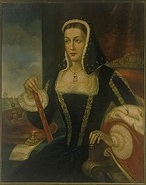
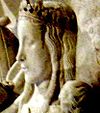



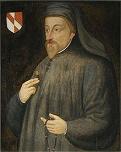
1387 On Jan. 5 Peter IV the Ceremonious of Aragon (b. 1319) dies, and on Jan. 6 his eldest son (by 3rd wife Eleanor, daughter of Peter II of Sicily) John I (the Hunter) (the Lover of Elegance) (the Abandoned) (1350-96) becomes king of Aragon (until May 19, 1396), abandoning his father's pro-English policy for an alliance with France and continuing support for the Avignon popes; his wife is Violante (Yolande) (Yolanda) of Bar (1365-1431), who next year is accused of trying to murder her son via witchcraft but ends up with a lot of power because of his frequent illnesses, bringing French Provencal troubadours to the court; after conquering most of Sicily, a revolt centered in the independent principality of Arborea led by judge (since 1383) Eleanor de Bas-Serra (Arborea) (Arbaree) (1347-1404) drives them out by the end of his reign. In Jan. Sigismund of Luxembourg celebrates the anniv. of Charles II's assassination by having his assassin Elizabeth strangled before her daughter Mary's eyes; after she is rescued from captivity in July by troops sent by Trvtko I of Bosnia (cousin of Elizabeth) and the croatian Frangipani family, she abandons her hubby and reconciles with the Horvats, granting them estates in Slavonia and N Bosnia, and lets Sigismund rule Hungary alone until her 1395 death. On Feb. 11 after defeating an invasion, a reluctant Juan I of Castile (b. 1357) makes peace with John of Gaunt and marries Philippa Plantagenet of Lancaster (1360-1415) in return for Gaunt giving up his claim to Castile, becoming the final step in the Anglo-Portuguese alliance against the French-Castile axis; after an icy initial period she bears him 9 sons and 3 daughters, becoming known as the Illustrious or Marvelous Generation they came out so well, incl. Edward (Duarte) I "the Philosopher" "the Eloquent" (1391-1438) Duke Peter (Pedro) of Coimbra (1392-1449), Prince Henry the Navigator (1394-1460), Isabella of Portugal, Duchess of Burgundy (1397-1471), John the Constable Prince (1400-42), and Ferdinand the Holy Prince (1402-43), becoming virtual ruler of Portugal (until July 19, 1415). In Mar. the Earl of Arundel captures a Flemish wine fleet and sells the wine in England, making him very popular. On Aug. 3 Danish king (since May 3, 1376) and Norwegian king (since July 29, 1380) Olaf II/IV (b. 1370) dies unexpectedly, and his mother is proclaimed "all-powerful lady and mistress and the Kingdom of Denmark's regent", followed next year by Norway's "reigning queen", going on to unite all three Scandinavian kingdoms under one crown for her successor Eric of Pomerania by the Kalmar Union in 1397-1523. On Dec. 19 after a coterie of five Lords Appellant, English noblemen led by Richard II's uncle Thomas of Woodstock, Duke of Gloucester (1355-97) (youngest of Edward III's seven sons), incl. Henry Bolingbroke, earl of Derby (future Henry IV) get in a power struggle with Richard II, accusing his favorite Richard de Vere, Duke of Ireland, Marquess of Dublin, 9th Earl of Oxford (136292) et al. of treason, and de Vere gathers an army and marches on London, he is defeated by the Lords Appellant at the Battle of Radcot Bridge over the Thames River in Oxfordshire at its boundary with Berkshire, but escapes to the Continent. The Ottomans capture the Byzantine port of Salonika (Thessalonica). Pope Urban VI starts an abortive war against his hometown of Naples for supporting the Avignon popes. HRE Charles IV's son Sigismund of Luxembourg (Brandenburg) (1368-1437) becomes King Sigismund I of Hungary after marrying Queen Mary of Anjou, or rather he becomes guardian of her kingdom; since he has ambitions to become HRE and thinks big thoughts, he ends up practically abandoning Hungary and letting the little kings keep on keeping on, ending up granting greater rights to the lesser nobles to counter them? The Empire of Scandinavia forms under an Ice Queen? Olaf II/IV of Denmark/Norway dies, ending the Norwegian line, and his mother Queen Margreta (Margaret) is elected regent of the realm (until 1412), introducing the Denmark-Sweden system of election into Norway; by winter she is acknowledged as regent of Denmark, and Sweden too, after the magnates depose and defeat Albert of Mecklenburg; Norway becomes united with Denmark, taking Iceland along with it. Milan conquers Verona and Vicenza. Emperor Ming Taizu completes the liberation of China from the Mongols. Richard II's tutor Sir Simon de Burley (-1388), constable of Dover Castle (1384-88) is recorded to have borrowed money from six Londoners this year and the next, leaving his clothes and bed as security, since clothing was quite expensive in those days. Nonfiction: The Forme of Cury (Forms of Cooking) is written in Sept. by "the chief master cooks of King Richard II [1367-1400]", containing Medieval recipes incl. yummy goose stuffed with sage, parsley, quinces, pears, grapes, and garlic; the grocery list for his 300 cooks incl. "Fourteen salted oxen, two fresh oxen, one hundred and twenty sheep, twelve boars, fourteen calves, one hundred forty pigs, three hundred kegs of lard and grease, three tons of salted venison, fifty swans, two hundred forty geese, fifty high-fat capons, eight dozen capons, sixty dozen hens, four hundred large rabbits, four pheasants, five herons, six young goats, five dozen pullets for jelly, twelve dozen pullets for roasting, one hundred dozen pigeons, twelve dozen partridges, eight dozen rabbits, twelve dozen curlews, twelve cranes, wild fowl, one hundred twenty gallons of milk, twelve gallons of cream, twelve gallons of curds, twelve bushels of apples, and eleven thousand eggs." Poetry: English brain man Geoffrey Chaucer (1343-1400) begins writing The Canterbury Tales, about a band of pilgrims traveling on horseback 65 mi. SE from the Tabard Inn in Southwark across the Thames River from London, down to Canterbury and back, telling stories; it contains the phrase, "busy as a bee"; it is unfinished at his untimely death in 1400, but it finally makes English an accepted lit. language. Novels: Jean d'Arras, L'Histoire de Lusignan (prose romance). Births: Spanish queen of Navarre (1425-41) Blanche I of Navarre (d. 1441)on July 6; daughter of Charles II of Navarre (1361-1425) and Eleanor of Castile (-1416). English Lancastrian king (1413-22) Henry V (d. 1422) on Sept. 16 in Monmouth, Wales; son of Henry IV (1367-1413); father of Henry VI (1421-71). Italian painter Fra Angelico (Guido di Pietro) (d. 1455) in Tuscany. Hungarian Turkish-butt-kicking nat. hero ("the White Knight") John (Janos) (János) Hunyadi (Hunyady) (Huniades) (d. 1456) (pr. JAH-nosh HOO-nyah-dee); son of Wallachian boyar Vojk and Erzsebet Morzsinay of Hungary; in 1409 HRE Sigismund I gives them Hunyad Castle, causing Vojk to become count of Hunyad; husband of Erzsebet Szilagyi (1410-83); father of Laszlo Hunyadi (1433-57) and Matthias Corvinus (1443-90). Deaths: Scottish queen Euphemia Ross (b. 1325). English poet William Langland (b. 1330). Spanish (Navarre) king Charles II the Bad (b. 1332). Danish king (1376-87) and Norwegian king (1380-87) Olaf II/IV on Aug. 3 in Faisterbo Castle, Faisterbo, Sweden; last Norwegian king to be born on Norwegian soil until Harald in 1937.

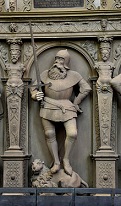

1388 In Feb. the five Lords Appellant secure the conviction of five of the king's counselors for treason for supporting his personal rule in the Merciless Parliament; Robert de Vere is one of the accused, but luckily he's abroad; Queen Anne goes down on her knees to Thomas Woodstock, duke of Gloucester to beg for the life of Richard II's tutor Sir Simon de Burley (b. 1336), warden of the Cinque Ports (since 1384) but is refused, and he is executed - who kept his clothes and bed? On July 1 Lithuanian grand duke (since 1392) Vaytautas the Great grants a charter of privileges to the Jews of Brest, followed by Trakai, Grodno (1389), Lutsk, Vladimir et al. On Aug. 5 (19?) after the Scottish-French army invades Berwick, it defeats the English at the Battle of Otterbourne (Chevy Chase); too bad, Berwick gov. Sir Henry Percy leads a counterattack, killing Scottish leader James, 2nd earl of Douglas (b. 1328), who is succeeded by his dark-complected son Sir Archibald of Galloway, who becomes "Black" Archibald "the Grim", 3rd Earl of Douglas (1328-1400) with the help of Robert Stewart, earl of Fife, who then combine to cause lame John Stewart, earl of Carrick (who was kicked last year by a horse ridden by Sir James Douglas of Dalkeith) to be forced on Dec. 1 to resign as lt. in favor of his younger bro' Robert, who then decides to forget the English and go after his haughty younger brother Alexander Stewart, lt. and justiciar N of Forth in the highlands to satisfy the lowlanders by stripping him of Moray and Ross, bringing peace to the Scottish-English frontier; even though he is captured and ransomed back, and the English side lost, Percy earns the nickname Hotspur. On Aug. 24 the Battle of Doffingen sees the Swabian League defeated by an imperial army under Count (since 1344) Eberhard II of Wurttemberg (1316-92), after which each of its free cities are taken and devastated. On Aug. 27 the Battle of Bileca sees a 7K-man Bosnian force under Grand Duke Vlatko Vukovic Kosaca (-1392) defeat an 18K-man Ottoman raiding party under Lala Shahin Pasha (1330-89) (ruler of Sofia) that invaded Hum, using heavy cavalry to break the Ottoman ranks and pursue them as they retreat, with Shahin barely managing to save himself with a small band of soldiers, and dying soon after. Charles VI assumes active rule in France, and regent Philip the Bold, duke of Burgundy retires to his duchy. King Albrecht is driven from Sweden. Galeazzoland, er, Milan conquers Padua with the help of Venice. A Florentine army defeats the Catalan Duchy of Athens at the Battle of Kaledes (Peritheorion) (Anastasioupolis), and the duchy is dissolved, along with the Catalan Co. The Aragon-Navarre Treaty fixes their mutual borders. Delhi Sultan (since 1351) Firoz Shah of Delhi dies, his kingdom in near anarchy, just in time for Tamerlane (1398); Mahmud Tughlak (Tughluq) (d. 1398) becomes sultan of Delhi (until 1398). John de Neville, 3rd baron Neville dies, and his son Ralph Neville, 4th Baron Neville de Raby, 1st Earl of Westmorland (1364-1425) becomes English warden of the Scottish border. The U. of Cologne in Cologne, Germany is founded with a charter signed by Pope (1378-89) Urban VI (1318-89); classes open on Jan. 6, 1389; it is closed by the French in 1789 and reopened in 1919. Architecture: The new Gothic Oviedo Cathedral (founded in 781) in Spain is begun by Toledo bishop Gutierre, with the original 802 chapel kept as the Camara Santa; it is filled with royal Asturian tombs, relics, and mss. Births: English soldier Thomas Montacute (Montagu), 4th Earl of Salisbury (d. 1428) on June 13; eldest son of John Montacute, 3rd earl of Salisbury (1350-1400); father of Alice Neville (1407-), wife (1425-) of Richard Neville, 5th earl of Salisbury (1400-60). Italian duke of Milan #2 (1402-12) Giovanni (Gian) Maria Visconti (d. 1412) on Sept. 7; son of Gian Galeazzo Visconti (1351-1402) and Caterina Viconti. Italian poet Leonardo Giustiniani (d. 1446). Deaths: Italian poet Antonio Pucci (b. 1301). Scottish military leader James, 2nd earl of Douglas (b. 1358) on Aug. 15 in Berwick (KIA). English warden of the Scottish border John de Neville, 3rd baron Neville (b. ?).




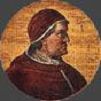




1389 On Feb. 24 king Albrecht's forces are defeated by Queen Margreta's in the Battle of Falkoping in Asle, and the king and his son Erik are taken captive; Mecklenburg rule in Sweden ends. He finally came? On May 2 23-y.-o. Richard II declares himself of age, takes control of his kingdom from his royal council, and on July 18 signs a 3-year Scottish-French Truce in Leulingham; England is now enjoying prosperous and peaceful times, and Richard is on good terms with Parliament, so he accepts constitutional rule for eight years before his despotic tendencies get the better of him and he spoils it all. On May 19 grand duke (since 1363) Dmitri II Donskoi (b. 1350) dies after becoming the first Russian grand duke to bequeath his titles without consulting the Mongol khan, and his son Vasilii (Basil) I (1371-1425) becomes grand duke of vodka-chugging Moskva (Moscow) (until 1425); Dmitri II's death allows exile metropolitan Cyprian to return next year after a near-fatal storm on the Black Sea. Ser-bi-a, and so are we, bye bye blackbird? On June 15 (June 28 New Style) (St. Vitus' Day) the Battle of Kosovo Field (Field of the Blackbirds) (First Battle of Kosovo) sees 27K-40K Muslim Turks under sultan (since 1359) Murad I (b. 1326) defeat 12K-30K Orthodox Christian Serbs under Prince Lazar allied with a Bosnian force of 5K-10 under Vuk Brankovic (1345-97), and another 5K-10K under his son Vlatko Vukovic Kosaca, Grand Duke of Hum (-1392) , both sent by Bosnian king Tvrtko I, along with a continent of Knights Hospitallers led by Croatian knight John of Palisna (-1389) from Vrana, incl. several thousand cavalry, becoming the first Ottoman V against a major European allied army, establishing Turkish rule S of the Danube until 1913; Lazar is captured in battle and killed; on June 16 Murad I is killed in his tent, allegedly by a Serb posing as a deserter, although it's more probable that he dies in battle, becoming the only Ottoman sultan to die in battle; Murad I is succeeded by his partly-Greek son Beyazid (Beyezid) (Bajazet) I (Yildirim) (the Thunderbolt) (1360-1403) as Ottoman sultan #4 (until 1403), beginning the conquest of W and C Anatolia (Saruhan, Aydin, Menteshe, Hamideli, Germiyan, E Karaman) (1389-90); Prince Lazar's son Stefan Lazarevic (1374-1427) becomes ruler of Ottoman vassal Serbia, with his mother princess Milica ("gracious") Hrebeljanovic (-1405) as regent; his sister PrincessOlivera Despina (1372-1444) marries sultan Bayezid I; Stefan goes on to modernize Serbia, introducing modern battle tactics, knight tournaments, and firearms; some Serbs hold out in the mountainous Montenegro (It. "black mountain") (Serb. "Crna Gora") region of the province of Zeta between Yugoslavia and Albania, named after 5,771-ft. Mt. Lovcen ("black mountain"), which becomes an independent principality (until 1910); the Germiyan Turkoman principality in W Anatolia (founded 1283) is annexed by the Ottomans (1389-90), along with the Aydin principality in W Anatolia (founded 1308) and the Saruhan principality in W Anatolia (founded 1313); Murad I begins the large-scale practice of Devshirme (Devsirme), the levying of Christian children for conversion to Islam and work in the Janissaries, palace, and admin.; from henceforth all Turkish sultans are sons of concubines - if not bitches? On Oct. 15 after changing the period between Holy Years to 33 to coincide with the length of Christ's life, and executing five cardinals for conspiring against him, headstrong quarrel-prone Pope (since 1378) Urban VI (b. 1318) dies (poisoned by the Romans for being older than 33?), and on Nov. 2 Naples-born Piero Tomacelli is elected Pope (#202) Boniface IX (-1404), ruling the city of Rome like an autocrat, bringing his hometown of Naples (which had supported the Avignon popes) back into his jurisdiction, and strengthening the papal states; he forbids Christians to harm Jews, destroy their cemeteries, or forcibly baptize them. In Oct. Margreta becomes official ruler of Sweden; Eric (Erik) of Pomerania (1381-1450) is acknowledged as king of Norway (until 1442); he is not coronated until 1392 (June 17, 1397?). Richard III of Scotland is injured by a horse, and hands control over to Richard Stuart, 1st Duke of Albany and Earl of Fife and Monteith (1341-1420). John of Gaunt returns to England, is made duke of Aquitaine, and helps Richard II of England regain power and assert his authority over the hostile barons led by Thomas of Woodstock, duke of Gloucester; William of Wykeham becomes Lord Chancellor of England. French king Charles VI restores his father's old advisers the Marmousets; meanwhile spendthrift Duke Louis of Orleans becomes unpopular in Paris, allowing his rival Duke Philip the Bold of Burgundy, supported by Queen Isabelle to pose as a reformer and lead the opposition. Wenceslaus IV eagerly proclaims an arrangement in Eger in N Hungary prohibiting all leagues between cities in the empire while confirming their political autonomy, dissolving the Swabian League. Count John III of Armagnac invades Aragon-controlled Majorca (until 1390). An ancient granite obelisk is retrieved from the Rhone River near Arles, France (45 mi. NW of Marseille), and housed there. French bishop of Troyes Pierre d'Arcis writes a letter expressing doubts about the authenticity of the Shroud of Turin and claiming he has exposed an unnamed artist as the forger. Inventions: The first Standard Paper Sizes, starting with imperial (22 in. x 30 in.), down to chancery are established in Bologna, Italy. Nonfiction: Giovanni da Prato, Paradiso degli Alberti; sings the praises of blind Florentine organist-singer-composer Francesco Landini (Landino) (1325-97), the Mozart of his day. Births: English soldier John of Lancaster, 1st Duke of Bedford (d. 1435) on June 20; 3rd surviving son of Henry IV (1366-1413) by 1st wife Mary de Bohun (1368-94); brother of Henry V (1386-1422); uncle of Henry VI (1421-71). Italian Godfather #1 Cosimo I de' Medici (the Elder) (Vecchio) (d. 1464) on Sept. 27 in Florence; son of Giovanni di Bicci de' Medici (1360-1429). Ottoman sultan #5 (1413-21) Mehmed (Mehmet) (Muhammad) I (the Restorer) (Celebi) (d. 1421); son of Beyazid I (1347-1403); father of Murad II (1403-51). Deaths: Uzbekistani Naqshbandi Order foundre Baha-ud-Din Naqshband Bukhari (b. 1318) in Bukhara. Persian poet Shams-ud-din Muhammed Hafiz (b. 1320). Russian prince St. Dmitri II Donskoi (b. 1350) on May 19 in Moscow. Ottoman sultan #3 (1362-89) Murad I (b. 1326) on June 15 in Prishtina District, Kosovo (KIA in the Battle of Kosovo). Ottoman bey Lala Shahin Pasha (b. 1330) in Plovdiv.